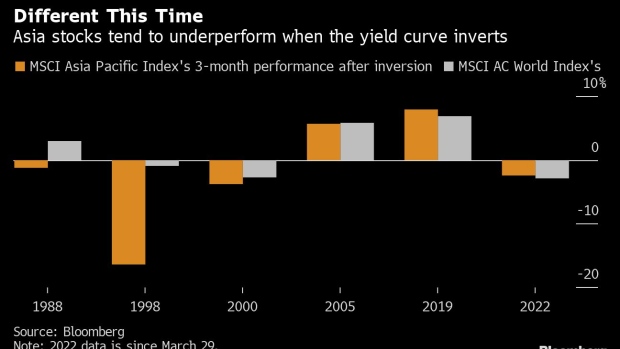Apr 9, 2022
Yield Curve Curse to Lift as Buffers Boost Asian Stocks
, Bloomberg News

(Bloomberg) -- Asia stock investors worried that the bond market’s signal of a U.S. recession may trigger another bout of underperformance have a cushion to fall back on.
Factors such as a more stable macro environment, policy stimulus in China and a boost from reopening economies are giving them comfort that history won’t repeat itself. In the past, almost whenever the two- to 10-year Treasury yield curve has inverted -- a bearish signal for the U.S. economy that was again triggered last month -- Asia has tended to underperform global peers.
Asia bulls are hoping regional equities can emerge as a relative haven after trailing for five quarters, as investors stateside worry about aggressive rate hikes from the Federal Reserve while those in Europe fret over the impact of the war in Ukraine.
“Unlike previous cycles such as the Asian financial crisis, Asia is better placed to absorb the impact of inflationary pressure given macro stability buffers,” said Zhikai Chen, head of Asian equities at BNP Paribas Asset Management. “Asia also continues to offer supportive technicals including modest valuations, light investor positions and reasonable strong fundamentals.”
In the previous five instances of inversion since 1988, the MSCI Asia Pacific Index fell 1.6% on average in the following three months. That lagged the global equity gauge by almost four percentage points, according to calculations by Bloomberg.
But bulls can point to 2005 and 2019 as two periods that bucked that trend, when the Asian index gained roughly between 6% and 8%, in line with or slightly better than global peers. This time, even though the measure has lost about 2% since the curve inverted end of March, it is faring better than the MSCI World gauge by half a percentage point.
Better Balances
Better current-account balances compared to the Asian financial crisis of 1997 and relatively high policy rates mean that regional currencies are on a stronger footing and economies have some leeway in battling a growth slowdown. Meanwhile, parts of Asia still enjoy inflation rates that are relatively subdued compared to the rest of the world.
The region is also behind the U.S. and Europe in reopening economies from coronavirus restrictions, not least in China which has a strict Covid-Zero policy. That means a boost from the easing of curbs lies ahead, something that is already helping Southeast Asian stocks outperform this year.
China Key
With hopes building that Chinese authorities will step in to support growth as vowed in mid-March, the region’s biggest economy -- a crucial ingredient during past periods of outperformance -- could emerge as another positive for Asia. Officials on Wednesday signaled they will step up monetary stimulus at an “appropriate time,” raising speculation that could come as early as next week.
Inverted Curves Don’t Matter If China Rebounds: Taking Stock
“China remains very interesting as it is at a very different position as compared to the Fed, we expect to see more monetary and fiscal stimulus measures to stabilize the economy,” said Catherine Yeung, investment director at Fidelity International.
Still, bears can argue that China has been slow to roll out such policies and higher commodity prices remain a drag on the region. And a recession in the U.S. would naturally weigh on Asia’s export-heavy economies.
“Asian equities will not be immune if external risk in the form of a likely U.S. growth slowdown amid tighter policy leads to a significant dent in the global risk sentiment later in the year,” Nomura Holdings Inc. strategists including Chetan Seth wrote in a note this month.
Valuation Buffer
That leaves valuations as one last part of Asia’s equity buffer that should at least appeal to global value investors. The MSCI Asia Pacific Index trades on a forward earnings discount to both the S&P 500 and Stoxx 600.
“As the U.S. battles high inflation and tightening monetary policy and the E.U. is faced with stark geopolitical risks and a possible energy crisis, Asian equities appear quite attractive from a valuation and macro perspective and have a decent chance to outperform for the remainder of the year,” according to David Chao, global market strategist for Asia Pacific ex-Japan at Invesco Ltd. “Asia is also relatively insulated from geopolitical risks and enjoys low consumer price inflation.”
©2022 Bloomberg L.P.





